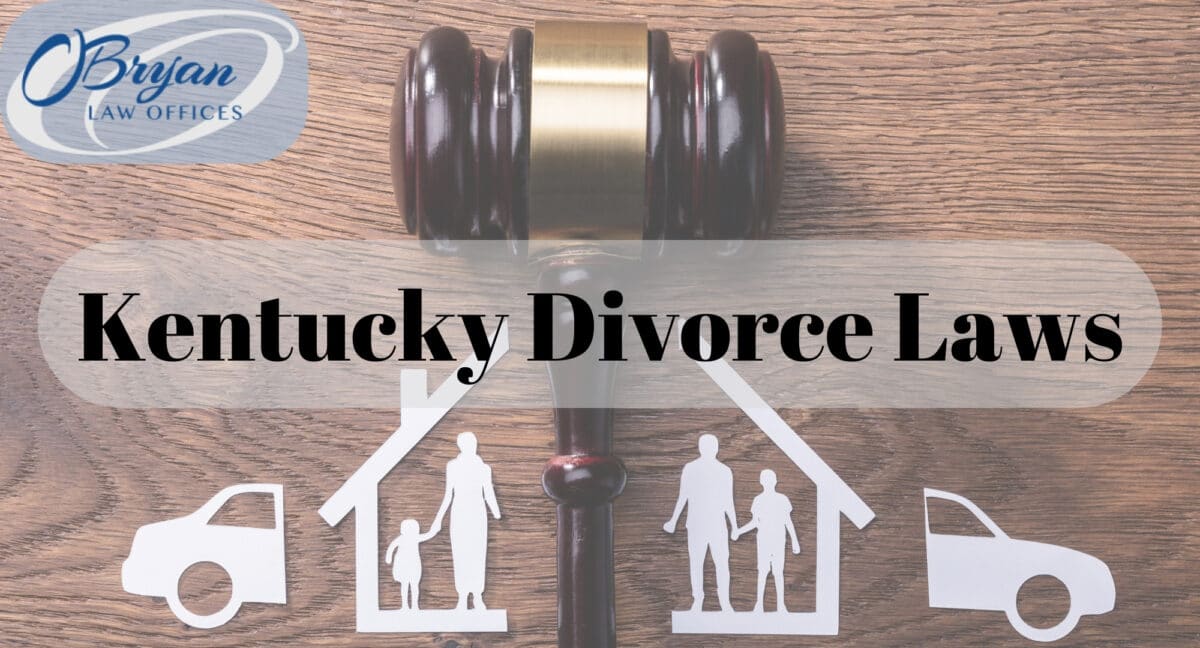Table of Contents
Divorce is not an easy decision to make, but sometimes it’s the best decision for the health of everyone involved. If you are considering filing for divorce in Kentucky, it may be in your best interest to contact an experienced Kentucky uncontested divorce lawyer to help you through the complicated divorce process. Whether you are ready to draw up divorce papers or considering a legal separation, the skilled team at the O’Bryan Law Offices can offer the legal services to help you. It takes a deep knowledge of Kentucky divorce laws in order to help divorcing couples. Call us today at 502-339-0222 for a free consultation on your case.
What Are Grounds for Divorce in Kentucky?
According to Kentucky law, someone can pursue divorce if the marriage is irretrievably broken. For a marriage to be irretrievably broken, there is no likelihood of getting back together or reconciliation. One spouse must believe the marriage is irretrievably broken. The couple must live apart for 60 days before a judge can issue a final divorce decree. Living under the same roof without sexual cohabitation for 60 days also meets this requirement.
If one spouse disagrees, then a Kentucky court must decide if the marriage is irretrievably broken. They consider reasons like the reason for the divorce filing, if there is a likelihood of reconciling, and other relevant factors (KRS § 403.170). The judge could ask for a continuation of 30-60 days and order that both parties receive counseling in the meantime.
No-Fault Grounds for Divorce
Kentucky is a no-fault state. To file for divorce in Kentucky, neither party has to prove fault. This means that there does not need to be proof of adultery, domestic violence, or anything else that would break up the marriage. As long as one party believes the marriage is irretrievably broken, divorce is an option.
Legal Separation
During a legal separation in Kentucky, the marital status does not change. The process is the same as divorce–you have to live apart for 60 days and prove that the marriage is irretrievably broken. Some couples choose a legal separation over divorce because of minor children. Moral or religious opposition to divorce and keeping health insurance are also reasons. Both parties must agree to the legal separation and the separation agreement. The separation agreement will have the details of child support and custody, spousal support, and marital property division. This is the same process as divorce, but the marriage remains intact. The separation must remain in effect for at least an entire year before a judge can issue a final divorce decree.
Residency Requirements
At least one spouse must live in Kentucky for at least 6 months before a Kentucky divorce petition can be filed. For a legal separation, Kentucky law also uses the same residency requirements.
Child Custody and Spouse Seeking Maintenance

Divorce can be a major financial decision. It can put a major strain on your financial resources, especially if you have to pay for spousal support. If your soon-to-be former spouse is unable to support themselves, the court may decide that you need to pay spousal support. The court decided the amount of the support and how long it’s paid by looking at a few different factors. They look at the financial resources of the spouse seeking maintenance. They also consider the standard of living and duration of the marriage and how long/how much training it would take the party seeking maintenance to find appropriate employment. There are three main forms of spousal maintenance.
Temporary Spousal Support
Temporary maintenance is support during the divorce proceedings. If one spouse has been paying the majority of living expenses, the other spouse may need help making ends meet on one income. This support ends when the final divorce decree is issued.
Rehabilitative Maintenance
The purpose of rehabilitative maintenance, or short-term support, is so that the supported spouse can acquire sufficient education. Once they have the appropriate degree or training, they can seek employment and support themselves.
Permanent Maintenance
Permanent maintenance is uncommon. It is usually reserved for spouses who cannot find gainful employment due to age or disability. This type of maintenance ends when the supported spouse dies or remarries.
Child Custody & Child Support
Child custody, child support, and visitation can be touchy subjects. If the child’s parents cannot agree on custody arrangements, a judge will decide. The judge considers factors like the mental and physical health of all individuals involved. They will also consider records of domestic violence and the child’s adjustment to his or her home, school, and community.
While joint custody has become increasingly common, it is not always the case. If the court deems that one parent should have legal custody or majority custody, they become the custodial parent. The non-custodial parent will usually have to pay child support if the custodial parent cannot meet reasonable needs. The Kentucky State Guidelines determine the amount of child support if the parents cannot agree.
All details of spousal support and child support need to be decided and agreed on before the divorce can be finalized.
Division of Marital Property and Debts

Property includes cash, personal property, pensions and retirement accounts, businesses, stocks, furniture, jewelry, and vehicles. Most retirement accounts cannot be withdrawn early without severe tax consequences. To avoid this, you need a qualified domestic relations order to split the account. This will let the account manager know that the spouse is an alternate payee and dictate which of the funds need to be split. Marital debt is also something that will be split in a divorce.
Marital vs Non-Marital Property
Your marital property is any property acquired during the marriage. This includes gifts, cash, and inheritance. Non-marital property, also called separate property, is anything you came into the marriage with. Non-marital property also includes anything inherited individually or gifted only to you.
Dividing Debts
In addition to dividing marital assets, marital debts are also divided. Unfortunately, even if the debt is not in your name, the court can still decide to split it equally if the debt benefitted both people in the marriage. Additional debt can significantly affect your life after divorce. If your spouse spent thousands on a credit card that is in your name as well, you could be responsible for the debt. This could lead to filing bankruptcy on joint debts after a divorce. It’s important to use experienced Louisville bankruptcy attorney services to make sure the settlement agreement is fair. A knowledgeable attorney can also help you with Kentucky debt consolidation or Kentucky debt relief options.
Is Kentucky a 50/50 State When it Comes to Divorce?

During a separation or divorce, Kentucky uses equitable distribution laws to split up assets and debts. These divorce laws are meant to divide property fairly. If a spouse lacks sufficient property to meet individual or child support needs, then the marital property apportioned to each party can be split equitably as opposed to 50/50.
Louisville No Contest Divorce Lawyers
In divorce proceedings, people who choose to DIY their divorce are held to the same standard as an attorney. This can be a difficult and convoluted procedure, especially if there is property or minor children shared. The licensed attorneys at the O’Bryan Law Offices can help you through this process and answer any questions you may have. Even during a seemingly straightforward uncontested divorce, having a knowledgeable divorce lawyer by your side can give you confidence in your case.
The legal services performed by the O’Bryan Law Offices include divorce, bankruptcy, and legal separation. For more information about how we can help, call us today at 502-339-0222.


